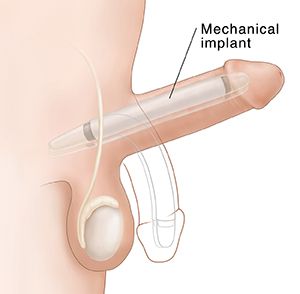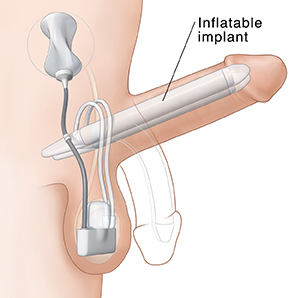Surgery for Erectile Dysfunction (Implants)
Surgery for erectile dysfunction (ED) isn't common, but it may be the best treatment in some cases. During surgery, your healthcare provider places an implant (also called a prosthesis) inside the spongy chambers of your penis. Then, the implant can be used to provide an erection.
Mechanical implants
This type of implant is easy to use. Bendable rods can make your penis look erect. When not in use, the rods can be bent downward. Some implants have joints that lock the implant into position.

Inflatable implants
This is the most complex type of implant. It allows your penis to look and feel either erect or flaccid. You pump fluid from a storage bulb to make your penis erect. A release valve makes your penis flaccid again. Using the device correctly takes some skill and practice.

Risks and possible complications
All surgery has some risk. Possible complications from surgery for ED include:
When to call your healthcare provider
Call your healthcare provider right away if you have any of these:
-
Fever of 100.4°F (38°C) or higher, or as advised by your provider
-
Chills
-
Trouble peeing
-
Burning feeling when you pee
-
Continued or increasing pain, or pain that isn't eased by medicine
-
Redness, swelling, or fluid leaking at your surgery site
-
Shortness of breath
-
Chest pain
-
Upset stomach (nausea) and vomiting
Online Medical Reviewer:
Chris Southard RN
Online Medical Reviewer:
Melinda Murray Ratini DO
Online Medical Reviewer:
Rita Sather RN
Date Last Reviewed:
3/1/2024
© 2000-2024 The StayWell Company, LLC. All rights reserved. This information is not intended as a substitute for professional medical care. Always follow your healthcare professional's instructions.